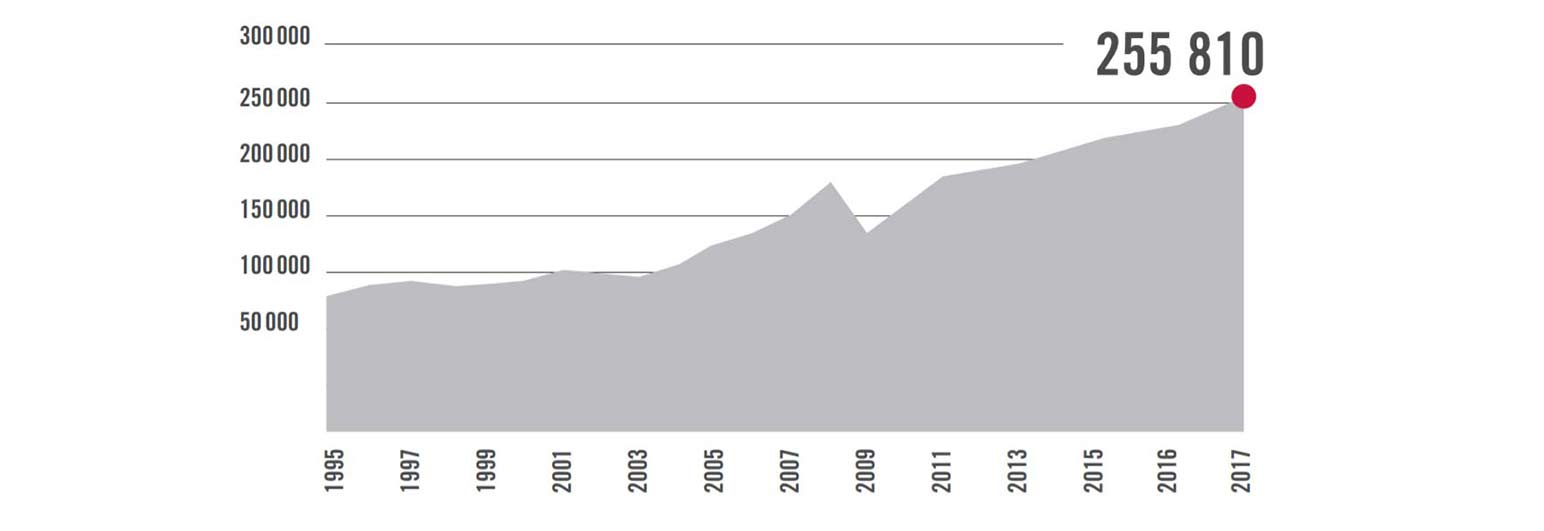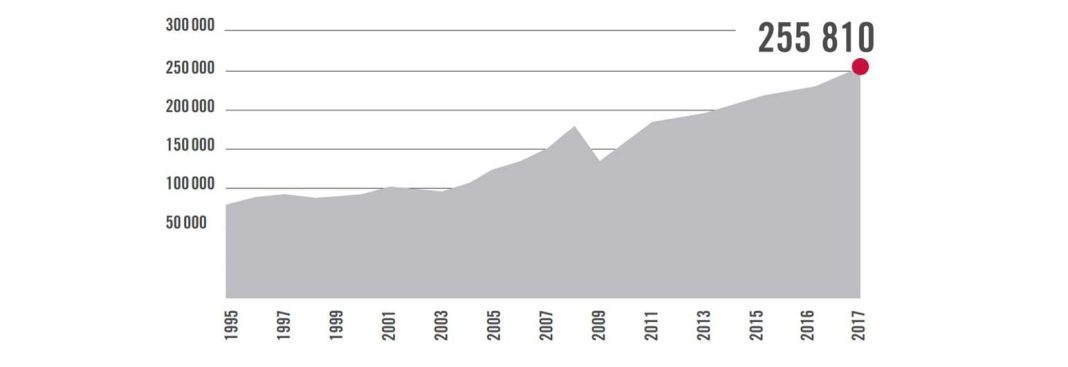 The United States has emerged as the global leader in creating millionaires, surpassing other countries by a wide margin. A recent study conducted by Capgemini revealed that the U.S. added 600,000 new millionaires in 2023, representing a growth rate of 7.3%. The total number of millionaires in the country now stands at 7.5 million. These individuals have amassed a combined fortune of $26.1 trillion, representing a 7% increase from the previous year.
The United States has emerged as the global leader in creating millionaires, surpassing other countries by a wide margin. A recent study conducted by Capgemini revealed that the U.S. added 600,000 new millionaires in 2023, representing a growth rate of 7.3%. The total number of millionaires in the country now stands at 7.5 million. These individuals have amassed a combined fortune of $26.1 trillion, representing a 7% increase from the previous year.
One of the key factors driving this surge in wealth is the rebound of the stock market towards the end of 2023. Combined with trillions of dollars in government spending and stimulus, the U.S. economy has witnessed a remarkable expansion of wealth. However, it is important to consider whether this trend can be sustained in the long run.
Elias Ghanem, the global head of the Capgemini Research Institute for Financial Services, highlights several potential challenges that could impact wealth creation. These include global conflicts, elections, interest rates, and the possibility of an economic slowdown. Ghanem emphasizes that the past decade has been exceptional in terms of wealth growth, fueled by low interest rates and liquidity. However, with changing economic conditions and geopolitical factors, the environment has become significantly different.
While the U.S. has experienced significant growth in its millionaire population, the global wealth landscape presents a more mixed picture. The number of millionaires worldwide increased by 5.1% in 2023, reaching 22.8 million individuals. Their collective fortunes reached a record high of $86.8 trillion. In terms of regional growth, North America and the Asia-Pacific region showed the strongest gains, with growth rates of 4.8% and 4%, respectively.
The investment preferences of wealthy individuals are also undergoing a shift. According to the Capgemini report, affluent investors are moving away from safe wealth preservation strategies towards more aggressive growth assets. Cash and cash-equivalent holdings have decreased from 34% to 25% of their portfolios, indicating a willingness to put their money to work. Fixed income holdings and real estate investments have seen increases, reaching 20% and 19%, respectively. However, the percentage of holdings in stocks has declined to its lowest level in over two decades, now standing at 21%. Despite the strong performance of major stock averages, wealthy investors are showing caution towards a market that is heavily influenced by a few dominant tech stocks.
Private equity and private credit are expected to attract significant inflows from affluent investors in the coming year. Two-thirds of millionaires plan to increase their investments in private equity in 2024, viewing it as an opportune entry point due to lower valuations. This shift towards alternative investments reflects a cyclical nature in investment preferences.
As the population of wealthy individuals continues to grow, the competition among wealth management firms to attract and retain clients becomes increasingly fierce. Capgemini’s study highlights the ultra-high net worth clients (those with a net worth of $30 million or more) as the most profitable and fastest-growing customer base. However, these clients are also the most challenging to serve, with an average of seven wealth management relationships. In fact, more than three-quarters of the ultra-wealthy plan to switch their primary wealth management firm in 2024.
To succeed in this competitive landscape, wealth management firms must focus on understanding their clients on a deeper level. They need to go beyond financials and gain insights into their clients’ family dynamics, risk profiles, investment biases, lifestyles, and geographic diversification. Ultra-wealthy clients value value-added services such as succession planning, taxes, concierge services, and access to private deals. Therefore, wealth management firms must conduct thorough research into their clients’ broader financial and family lives.
Additionally, wealth management firms face a growing challenge from family offices, which are the private investment arms of affluent families. More than half of ultra-wealthy investors plan to establish a family office, citing privacy, personalization, and independence as key advantages. Instead of directly competing with family offices, wealth management firms should consider becoming strategic partners by offering a comprehensive range of financial and non-financial products. This includes global advice across multiple countries, lending services, lifestyle advice, insurance solutions, portfolio monitoring, real estate guidance, travel and healthcare advice, and next-generation education. By providing this holistic ecosystem, wealth management firms can position themselves as winners in the battle for ultra-high net worth clients.
In conclusion, the United States has experienced significant growth in its millionaire population, outpacing other countries around the world. However, sustaining this growth in the face of changing economic conditions and geopolitical challenges poses a significant question. Meanwhile, the global wealth landscape presents a more mixed picture. Affluent investors are shifting their investment strategies towards aggressive growth assets and alternative investments such as private equity. Wealth management firms must adapt to the changing needs of ultra-high net worth clients by providing a comprehensive suite of financial and non-financial services. By understanding clients on a deeper level and offering a truly global ecosystem, these firms can position themselves for success in the increasingly competitive wealth management industry.

